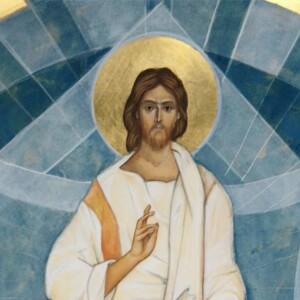
Against Those Who Attack the Divine Images (First Apology) - St. John of Damascus
 2023-01-25
2023-01-25
A reading of “Against Those Who Attack the Divine Images” (First Apology) by St. John of Damascus (+749). In response to the iconoclast heresy of the 8th century St. John wrote three treatises in defense of the apostolic tradition. His defense centers on the incarnation of Christ, how the invisible God became visible, and how from the witness of Holy Scripture we are commanded by God to make and venerate holy icons. St. John’s message is ever relevant as sectarians and heretical-minded people continually find new ways to reject the veneration of icons which are a divine safeguard for truth and a means of God’s economy of salvation.
0:10 Introduction - When the Church is being attacked “I deem it unreasonable to keep silence"
1:40 St. John knows the teaching of the Church and exclaims we must not forsake Her ancient tradition
2:55 St. John’s prayer and stance in setting forth the Orthodox teaching on icons
4:08 St. John begins his defense of icons; there is one God Whose Son became flesh, the invisible became visible
7:15 Passages from Scripture that command no graven images lest idolatry ensue
8:47 More passages from Scripture showing that nothing is to be adored in the way God is to be adored
10:16 The newness of life in Christ, the fulfillment of the law in Christ, no longer means images are such a stumbling block to worship of God alone.
13:58 God has ordained that the intangible is made known through that which we can see
17:11 The images are of two kinds: words written down or material images. Either reject the authority of God Who willed them to be made or esteem them as is fitting.
18:10 The degrees of worship: 1) adoration which we offer to God alone 2) the honor we offer the friends of God, for the sake of God 3) the respect as we see with Abraham and the sons of Nahor.
19:30 God commands cherubim and other images to overshadow the mercy seat, calling us to worship Him through created matter
21:43 “I do not worship matter; I worship the Creator of matter who became matter for my sake..."
23:28 “Either do away with the honor and veneration these things deserve, or accept the tradition of the Church and the veneration of images.”
24:05 Exodus 31:1-6 and Exodus 35:4-10
26:44 The images worthy of God “sanctify the noblest of the senses, which is that of sight.”
28:08 If God ordered twelve stones to be taken from the Jordan after Israel passed through, shall we not make images of Christ and His saving passion?
29:06 It is utter foolishness to make images of Christ and not of His saints, for he says, “I will glorify those who glorify Me” (1 Sam 2:30).
31:30 On the images God commanded David and Soloman to make in the temple, and how depicting the saints is far greater
33:04 “Shall we strip [the saints] of the glory given them by the Church? What audacity! What effrontery of mind, to fight with God, refusing to follow His commands!”
38:08 Christians have seen God in human form. Peter’s shadow and Paul’s handkerchief healed and put demons to flight. Therefore, we glorify the saints in material images.
39:12 St. Basil the Great teaches that the tradition of the Church is passed down both orally and in writing and “both sources have equal power to lead us to righteousness.”
41:03 “Pagans make images of demons which they address as gods, but we make images of God incarnate, and of his servants and friends, and with them we drive away the demonic hosts.”
41:45 St. John: the words against icons from St. Epiphanius are “fictitious and inauthentic.” Furthermore, “one exception cannot be a law for the Church…”
43:23 “The former holy things, the tent, and everything therein were made by hands, and no one can deny that they were venerated.”
More Episodes
 2021-12-22
2021-12-22
 2021-12-20
2021-12-20
 2021-12-16
2021-12-16
Create your
podcast in
minutes
- Full-featured podcast site
- Unlimited storage and bandwidth
- Comprehensive podcast stats
- Distribute to Apple Podcasts, Spotify, and more
- Make money with your podcast
It is Free
- Privacy Policy
- Cookie Policy
- Terms of Use
- Consent Preferences
- Copyright © 2015-2024 Podbean.com





